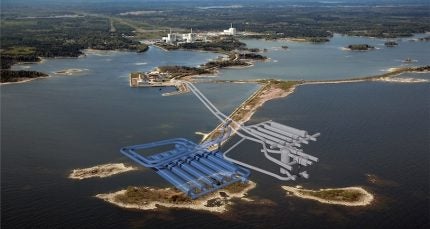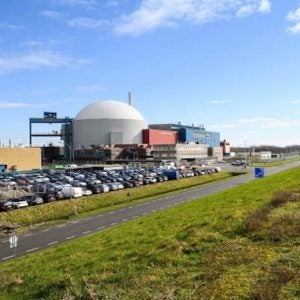
Swedish radioactive waste management company Svensk Kärnbränslehantering SKB can now begin excavation works to extend its Final Repository for Short-Lived Radioactive Waste (SFR) at Forsmark following the approval of its safety report by Swedish Radiation Safety Authority (SSM – Strålsäkerhetsmyndigheten).
SKB is owned by nuclear power companies Vattenfall AB (36%), Forsmarks Kraftgrupp AB (30%), OKG Aktiebolag (22%) and Sydkraft Nuclear Power AB (12%), and has a statutory duty to deal with the disposal of Swedish nuclear waste and to pay for these operations.
Since the mid-1980s both the SFR and Central Interim Storage Facility for Used Nuclear Fuel (Clab) have been in operation. Safe transport of radioactive waste from the nuclear power plants takes place using special vessel M/S Sigrid.
In December 2022 SKB received an environmental permit from the Land & Environmental Court for extension of SFR, which meant that work above ground could be started. SSM’s permit was the next important step in accordance with the Nuclear Engineering Act and means that SKB can start underground work. SKB had applied in December 2014 to expand repository. The application was submitted to the government by the Land & Environment Court and SSM in November 2019. In April 2021, the municipality of Östhammar, where the SFR is located, approved the extension. Following a government decision in December 2021 to approve the application, the matter was referred back to SSM and the Court.
“Now we have all permits in place to expand the plant so that we can receive our owners’ operational and demolition waste. We look forward to starting rock work in mid-December,” said SKB CEO Stefan Engdahl.
SKB submitted the application for construction and operation of the expanded SFR to SSM in March 2023. The application included, among other things, a preliminary security report, system descriptions and a settlement plan. SSM approved the safety report but has also set conditions. Before the repository can be erected, SKB has to to submit a developed and detailed account of the design. Once this is approved SKB must also present a plan of the measures that will be taken during the construction, and the plan must be updated every six months.
“Before the expanded plant can begin test operation, a renewed safety report needs to be reviewed and approved by the Radiation Safety Authority, said Anki Hägg, an investigator at SSM’s nuclear testing unit.
SFR already stores short-lived operational waste from the Swedish NPPs and radioactive waste from healthcare, industry and research. The existing part of the repository, which began operations in 1988, is about 60 metres below the bottom of the Baltic Sea with a storage capacity of 63,000 cubic metres. The facility comprises four 160-metre-long rock vaults and a chamber in the bedrock with a 50-metre high concrete silo for the most radioactive waste. Two parallel kilometre-long access tunnels link the facility to the surface.
The planned new part of the repository will be at a depth of 120-160 metres. The expansion consists of six different repositories and when complete the plant will have a total storage capacity of about 180,000 cubic metres. Expanding SFR will take about six years, three years of rock work and three years of installation work.
In February, the Swedish Government approved SKB’s plans for a final repository system for used nuclear fuel in Forsmark and an encapsulation plant in Oskarshamn. SKB has meanwhile applied to increase the amount of used fuel that can be stored in Clab from 8,000 tonnes to 11,000 tonnes pending completion of the final repository.






